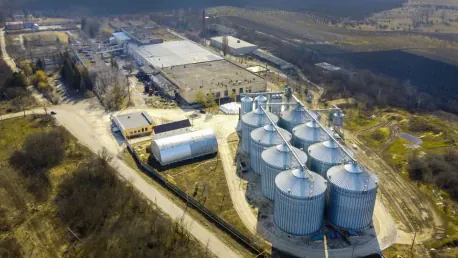Alfa Laval is making significant strides in the biofuel industry, particularly in sustainable aviation fuel (SAF) production, underscoring the company’s pledge to innovation and sustainability. Recently, the firm secured two substantial contracts worth a collective 350 million SEK to provide advanced Hydrotreated Vegetable Oil (HVO) pre-treatment technology to what will become Europe’s largest biofuel facility. This facility is a collaborative venture between Cepsa Bioenergia San Roque S.L. (CSBR) and Bio-Oils Energy, part of the Apical Group. Currently under construction in Huelva, Spain, the plant is set to become operational by 2026, with aspirations to produce 500,000 tonnes of SAF and renewable diesel annually. Upon completion, CSBR’s renewable fuels production capacity will double to an impressive one million tonnes per year, marking a critical milestone in the pursuit of low-carbon energy solutions. This development is particularly crucial as the transportation sector alone contributes nearly a quarter of the world’s greenhouse gas emissions.
Advanced Technology for Sustainable Energy
The Significance of Hydrotreated Vegetable Oil
Hydrotreated Vegetable Oil (HVO) technology stands at the forefront of Alfa Laval’s innovative contributions to the biofuel industry. HVO is refined through a hydrotreatment process that uses hydrogen as a catalyst, transforming vegetable oils and animal fats into a higher-quality, renewable alternative to conventional fossil fuels. This process removes impurities and enhances fuel properties, making HVO suitable for use in existing diesel engines without needing modifications. The use of HVO significantly reduces greenhouse gas emissions, making it an ideal solution for sectors like transportation, where traditional fossil fuels have long dominated.
One of the key aspects of Alfa Laval’s HVO technology is its efficiency in pre-treatment, a critical phase in the biofuel production cycle. The pre-treatment units that Alfa Laval will supply to the Huelva facility are engineered to handle a broad spectrum of raw materials. These include waste oils and fats, underscoring Alfa Laval’s commitment to using sustainable feedstocks. By ensuring that the raw materials are adequately prepared for the subsequent hydrotreatment process, these pre-treatment units play a vital role in achieving the high-quality output of SAF and renewable diesel. This efficiency not only boosts the overall yield but also optimizes the cost-effectiveness of the production process, thereby supporting the economic viability of large-scale biofuel production.
Environmental Impact and Sustainability Goals
The environmental benefits of incorporating HVO in energy production are compelling, particularly in the context of mitigating climate change. By integrating HVO pre-treatment technology into its operations, the Huelva facility aims to achieve a 75% reduction in CO2 emissions compared to traditional biofuel plants. This substantial reduction echoes the broader industry goal of transitioning to cleaner energy sources that can help limit global warming to below 2 degrees Celsius, as stipulated by international climate agreements.
Moreover, the facility’s capacity to produce 500,000 tonnes of SAF annually will significantly contribute to reducing aviation-related emissions, a sector notoriously difficult to decarbonize. Sustainable aviation fuel has a pivotal role in reaching the aviation industry’s targets for emission reduction, which include a 50% reduction in net emissions by 2050 compared to 2005 levels. By boosting the availability of SAF, the Huelva facility will help airlines meet these ambitious goals, fostering a more sustainable future for air travel.
Alfa Laval’s Strategic Partnerships
Collaboration and Industry Impact
Strategic partnerships have been a cornerstone of Alfa Laval’s approach to driving innovation and sustainability in the biofuel sector. The collaboration with CSBR and Bio-Oils Energy exemplifies how synergetic relationships can amplify the impact of technological advancements. This joint venture is not only a testament to the trust placed in Alfa Laval’s technology but also highlights the broader industry commitment to sustainable energy solutions. By pooling resources, expertise, and shared goals, these partnerships pave the way for groundbreaking projects that can scale up the production of renewable fuels and contribute significantly to the global energy transition.
Furthermore, partnerships like these enable the sharing of best practices and technical knowledge, fostering a culture of continuous improvement and innovation. As the project progresses, the insights gained from the construction and operational phases of the Huelva facility will be invaluable. These learnings can be applied to future projects, enhancing the design and efficiency of new biofuel plants worldwide and accelerating the pace at which sustainable energy solutions are deployed.
Future Prospects and Industry Growth
Alfa Laval is making significant progress in the biofuel sector, especially in the production of sustainable aviation fuel (SAF), showcasing its commitment to innovation and sustainability. The company recently landed two major contracts totaling 350 million SEK to supply advanced Hydrotreated Vegetable Oil (HVO) pre-treatment technology to what will become Europe’s largest biofuel facility. This facility is a joint effort between Cepsa Bioenergia San Roque S.L. (CSBR) and Bio-Oils Energy, part of the Apical Group. Now being built in Huelva, Spain, the plant aims to be operational by 2026, with a goal to produce 500,000 tonnes of SAF and renewable diesel annually. Once completed, CSBR’s renewable fuel production capacity will double to an impressive one million tonnes per year, marking a pivotal step in the quest for low-carbon energy solutions. This development is particularly important because the transportation sector alone is responsible for nearly a quarter of the world’s greenhouse gas emissions.









